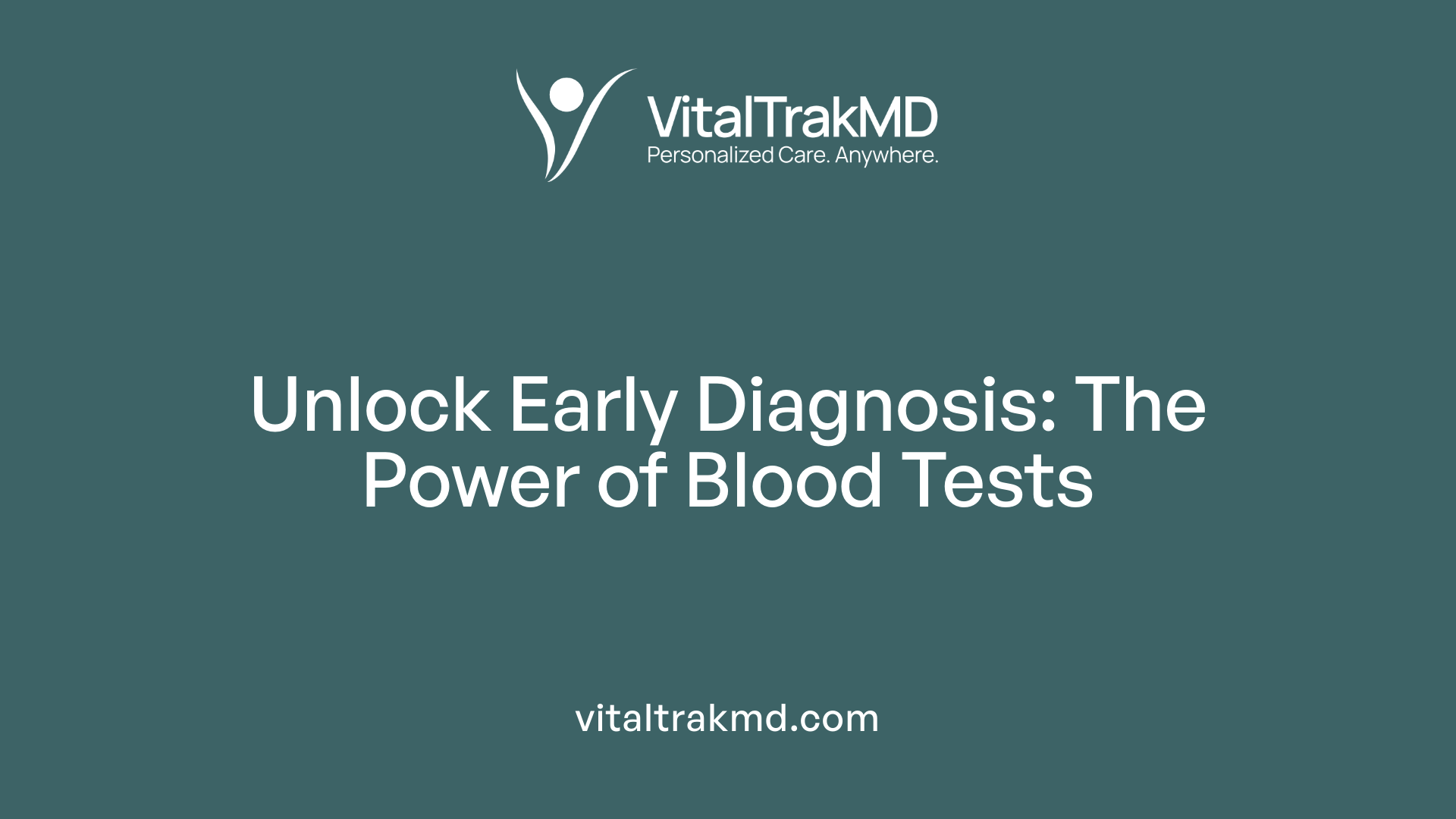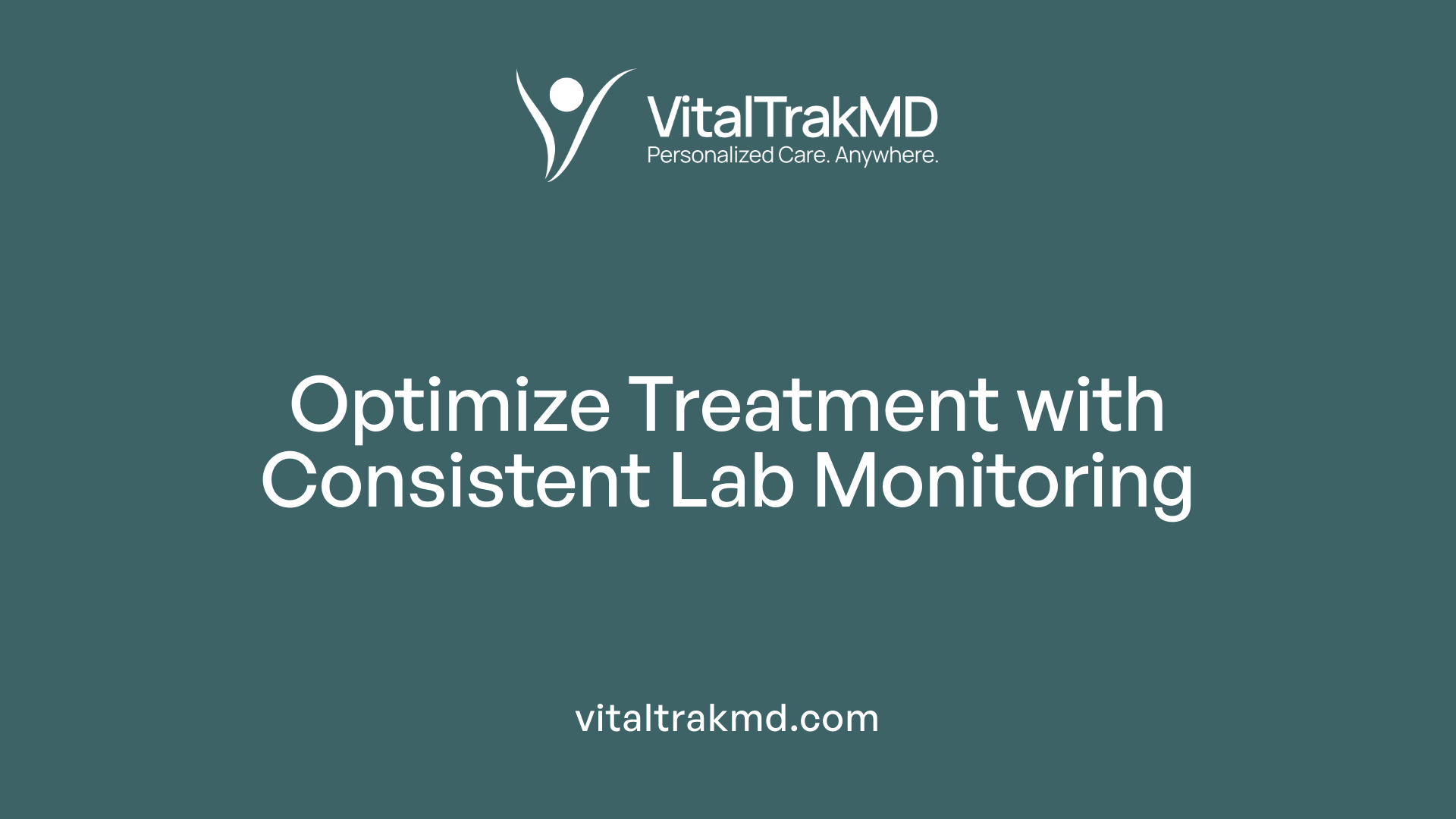The Risks of Skipping Lab Work in Chronic Disease Management

Understanding the Importance of Lab Work in Managing Chronic Conditions
Chronic diseases like diabetes, heart disease, and kidney conditions are leading causes of morbidity worldwide. Managing these illnesses effectively requires a proactive approach centered on regular monitoring through blood tests. This article explores why skipping lab work can jeopardize health, the risks involved, and how consistent testing contributes to early detection, better treatment outcomes, and overall wellness.
The Vital Role of Blood Tests in Early Detection and Prevention

Why is monitoring health through blood tests important?
Monitoring health via blood tests plays a crucial role in maintaining overall well-being and preventing serious health problems. Blood evaluations offer vital insight into how organs and bodily systems are functioning, often revealing issues before symptoms appear. For example, blood tests can detect conditions like anemia, infections, diabetes, heart disease, and even certain cancers early on.
They are also instrumental in assessing the effectiveness of ongoing treatments and guiding healthcare decisions. Routine testing helps to identify risks associated with chronic diseases, such as high blood pressure or high cholesterol, enabling preventive interventions. Overall, blood tests serve as an essential tool for early diagnosis, better management, and proactive health care.
How does lab work contribute to early detection and prevention of chronic conditions?
Laboratory work significantly enhances the ability to detect chronic conditions at an early stage. By identifying abnormal health markers such as elevated cholesterol levels or blood glucose, clinicians can diagnose issues like diabetes and cardiovascular disease before symptoms become severe.
Advances in laboratory testing allow health professionals to establish a health baseline and monitor subtle changes over time, which helps in tailoring personalized treatment plans. Detecting health issues early often means less invasive, less costly treatments and better health outcomes.
Moreover, early detection through blood tests supports preventive strategies that can delay or prevent the progression of diseases, leading to healthier aging and reduced healthcare costs.
What are the health risks and potential complications of skipping lab tests?
Avoiding routine blood tests can have serious consequences, including delayed diagnosis and worsening of undetected health conditions. Without regular testing, diseases like hypertension, diabetes, or infections might progress unnoticed, potentially leading to severe complications.
Overuse of unnecessary tests can also pose risks, such as false positives that result in invasive procedures, increased anxiety, and higher healthcare expenditures.
Maintaining a balanced approach to lab testing—adhering to medical guidelines—helps to optimize patient safety and health outcomes. Regular, evidence-based testing ensures early detection and effective management, reducing the risk of hospitalizations, disease progression, and other adverse events.
| Aspect | Importance | Impact | Additional Details |
|---|---|---|---|
| Silent Health Issues | Detect early conditions like hypertension and diabetes | Prevent complications and improve treatment outcomes | Early screening saves costs and prevents severe events like heart attacks |
| Chronic Disease Management | Monitor disease progression and control | Adjust treatments promptly to avoid health deterioration | Blood tests guide therapy and promote active health management |
| Cost and Outcomes | Cost-effective through early intervention | Reduces long-term healthcare expenses and improves quality of life | Routine testing supports proactive and personalized care |
Recent global data highlights that over 60% of populations in countries like Egypt, Nigeria, and India have never undergone blood testing, underscoring the critical need for accessible, routine blood assessments. Countries with high disease burdens often see late diagnoses and underdiagnosis issues, which can be mitigated through improved testing access.
In managing chronic conditions, blood tests such as HbA1c for diabetes, serum creatinine for kidney health, and lipid panels for cardiovascular risks are indispensable. They facilitate early intervention, disease monitoring, and individualized care strategies, ultimately reducing health risks and improving patient outcomes.
Utilizing data from laboratory tests combined with electronic health records allows healthcare providers to identify high-risk populations faster. Implementing flexible testing options, community participation, and personalized engagement strategies can bridge gaps in care and amplify preventive health efforts.
The Impact of Inadequate Lab Monitoring on Treatment Outcomes

What are the consequences of neglecting lab testing on disease management and treatment outcomes?
Lab testing plays a crucial role in the effective management of chronic and acute diseases. When individuals or healthcare providers neglect routine blood tests and fail to follow up on test results, the consequences can be significant.
One major impact is delayed diagnosis of health issues such as diabetes, cardiovascular diseases, cancers, infections, and thyroid disorders. For example, without proper blood glucose monitoring, a patient with prediabetes might not be identified until severe symptoms or complications occur. Similarly, missed cholesterol or kidney function tests can hide early signs of heart disease or renal impairment, allowing these conditions to progress unchecked.
This delay often leads to worsened health outcomes. By the time the disease is detected, it may have advanced to more severe stages, requiring complex treatment or hospitalization. Premature or inappropriate treatment is also common when lab data are ignored, risking adverse effects or unnecessary procedures. Inadequate follow-up on test results may result in missed diagnoses and mismanagement, which further compromises patient safety.
How does lack of proper lab monitoring influence disease progression?
Without regular blood testing, chronic illnesses tend to worsen over time without appropriate interventions. For instance, uncontrolled diabetes can lead to nerve damage, vision loss, and kidney failure. Chronic kidney disease may advance to end-stage renal failure without timely adjustments in treatment based on blood creatinine or eGFR results.
Furthermore, without ongoing assessment, subtle changes in health status—such as increasing cholesterol or blood pressure—may go unnoticed until they cause an acute event like a stroke or heart attack. Monitoring lipid levels, blood pressure, and inflammatory markers helps detect early deterioration, enabling timely medication adjustments or lifestyle interventions.
This neglect also hampers the evaluation of treatment effectiveness, preventing healthcare providers from making data-driven decisions to optimize patient care.
What are the risks of severe complications, hospitalizations, or death due to inadequate lab follow-up?
When lab testing is neglected, the risk of severe complications dramatically increases. Elevated blood sugar levels without proper management can result in diabetic ketoacidosis or hypoglycemia. Similarly, unmanaged high cholesterol or inflammation levels increase the likelihood of heart attacks, strokes, and other cardiovascular events.
These complications often lead to emergency hospitalizations, higher healthcare costs, and decreased quality of life. In some cases, failure to detect and treat infections or blood disorders early can be fatal.
Studies indicate that countries with significant portions of the population never undergo routine blood tests, like in parts of Egypt, Nigeria, and India, face increased risks of underdiagnosis. Such underdiagnosis contributes to higher disease burden and mortality.
How can comprehensive monitoring improve health outcomes?
Implementing consistent blood testing protocols and robust follow-up systems improves early detection of health issues. Using electronic health records, laboratory data integration, and patient engagement ensures timely action on abnormal results.
In high-burden populations, strategies such as community-based testing, flexible access points, and education about the importance of routine lab work can help bridge gaps.
Furthermore, leveraging data analytics to identify at-risk patients enables proactive interventions. These data-driven approaches improve disease management, reduce hospitalizations, and ultimately save lives.
By making lab monitoring and follow-up an integral part of healthcare services, providers can prevent disease progression, reduce complications, and enhance overall treatment outcomes.
| Aspect | Impact | Additional Details |
|---|---|---|
| Diagnosis | Delays in detecting diseases like diabetes or heart disease | Can lead to worsening health, increased risk of complications |
| Disease Progression | Chronic illnesses worsen without monitoring | Examples include kidney failure, diabetic complications |
| Severe Risks | Heart attacks, strokes, hospitalizations, death | Increased when lab follow-up is neglected |
| Strategies | Data integration, patient engagement, community access | Essential for improving outcomes and reducing healthcare costs |
Effective management of health conditions relies heavily on consistent lab testing. Overcoming barriers to testing and ensuring strict follow-up can significantly impact patient survival and quality of life.
Risks of Delays and Dismissals in Laboratory Testing

What are the risks associated with delays or dismissals of necessary blood tests?
Blood tests are a vital component of diagnosing and managing chronic diseases such as diabetes, heart disease, and kidney disorders. When these tests are delayed or dismissed, the consequences can be serious and far-reaching.
One of the biggest dangers is the potential for missed or delayed diagnoses. Conditions like high blood sugar, high cholesterol, or developing infections require timely detection for effective intervention. Without prompt testing, health issues often go unnoticed until they manifest as severe symptoms or complications.
Delayed testing can lead to underdiagnosis, which might cause patients to not receive necessary treatments. For instance, a person with undiagnosed diabetes could experience worsening health, including nerve damage, vision loss, or cardiovascular complications. Similarly, in infectious diseases like HIV or malaria, postponing blood tests delays treatment, increasing the risk of severe illness or transmission.
Another significant risk involves the failure to follow up because results are not communicated effectively. This breakdown can happen due to resource limitations, systemic inefficiencies, or unclear responsibilities in healthcare settings. When results are not promptly reviewed or shared with patients, critical conditions can be overlooked, and vital interventions may be missed.
Systemic challenges, such as limited testing facilities, lack of trained personnel, and inefficient data management, contribute to these delays. For example, in high-disease-burden countries like India, Nigeria, or the Philippines, many populations have never undergone essential blood testing, increasing the risk of undiagnosed chronic conditions.
This situation exacerbates health disparities, as vulnerable groups, including those in rural areas or with limited access to healthcare, are disproportionately affected. Consequently, delayed testing can lead to advanced disease stages, more complex treatments, and higher healthcare costs.
In summary, dismissing or delaying necessary blood tests compromises early diagnosis and timely management, risking preventable health deterioration, increased morbidity, and even mortality. Ensuring proper systems are in place for the timely order, execution, and communication of blood test results is crucial for improving health outcomes worldwide.
The Significance of Consistent Lab Work in Disease Management

Why is regular lab work important in managing chronic diseases?
Routine blood tests are a cornerstone of effective chronic disease management. They offer a detailed picture of a patient’s health status, allowing healthcare providers to monitor how well a disease is controlled and to identify early signs of potential complications.
For diseases such as diabetes, cardiovascular issues, and kidney disorders, lab work plays an essential role in tracking disease progression. For example, the HbA1c test measures average blood glucose levels over two to three months, helping assess long-term blood sugar control. Similarly, serum creatinine and estimated glomerular filtration rate (eGFR) tests evaluate kidney function, which is critical in managing and detecting the progression of chronic kidney disease.
Regular testing enables healthcare professionals to evaluate the effectiveness of ongoing treatments. Adjustments to medications, lifestyle recommendations, or additional interventions can be made based on lab results. This ongoing monitoring helps prevent disease worsening, reduces the risk of serious complications, and can lower overall healthcare costs.
In addition, compliance with blood testing guidelines in various chronic conditions helps detect subtle health changes early. These might include small increases in cholesterol levels, weight gain, or markers of inflammation. Detecting such changes before symptoms appear allows for timely modifications in diet, physical activity, or medication, enhancing long-term health outcomes.
Monitoring disease progression and treatment response
Consistent lab work provides invaluable insights into how a disease is evolving and how well a treatment plan is working. For instance, in managing cardiovascular health, lipid panels monitor cholesterol trends, which guide decisions on medications such as statins. In chronic kidney disease, tracking serum creatinine and eGFR levels helps determine whether the disease is stabilizing or worsening.
In diabetes management, periodic blood sugar tests and HbA1c levels inform whether blood glucose is being controlled effectively or if adjustments are necessary. Regular monitoring helps prevent severe complications like diabetic neuropathy, retinopathy, or cardiovascular issues.
For patients with chronic conditions, lab data also reveal complications or new issues that require intervention. This proactive approach reduces emergency episodes and hospitalizations.
Detecting subtle health changes over time
Health concerns often evolve gradually before producing obvious symptoms. Routine blood testing can uncover these issues early. Small but significant shifts in lipid levels, kidney function, or blood counts may signal the need for intervention.
For example, a slight increase in cholesterol levels might indicate the need for medication adjustments or lifestyle changes. Early detection of inflammation or infection markers can prompt further investigation and prevent disease progression.
Tracking changes over time helps healthcare providers tailor personalized care plans for each patient, emphasizing prevention and early intervention.
Guiding lifestyle modifications and preventive care
Lab results inform not only medication management but also lifestyle choices. Elevated blood sugar levels or cholesterol readings can motivate patients to adopt healthier diets, increase physical activity, and quit smoking.
Annual checkups that include comprehensive lab testing also update vaccination needs and screening schedules, such as mammograms and colonoscopies, which are essential for early detection of cancers.
Maintaining such regular health surveillance fosters a proactive rather than reactive approach to health, empowering individuals to take control and reduce their risk of adverse outcomes.
Overview of blood tests in managing chronic diseases
| Disease Type | Common Blood Tests | Purpose | Additional Notes |
|---|---|---|---|
| Diabetes | HbA1c, fasting glucose | Assess blood sugar control, detect early signs of diabetes | Regular testing reduces risk of complications |
| Cardiovascular | Lipid panels, CRP, homocysteine | Evaluate cholesterol levels and inflammation | Guides preventive therapy |
| Kidney Disease | Serum creatinine, eGFR | Monitor kidney function and disease progression | Critical for early detection |
| General health | Complete blood count (CBC), blood chemistry | Detect infections, anemia, and other conditions | Helps diagnose unexplained symptoms |
The advantage of data-driven health management
By leveraging electronic health records, laboratory data, and claims information, healthcare providers can better identify high-risk patients and their needs.
Data analysis enables targeted interventions, personalized care plans, and efficient resource allocation. Implementing such strategies can lead to improved health outcomes, especially in populations with high disease burdens.
Regular blood testing remains an unmissable part of chronic disease management that helps detect early, guide treatment, and improve overall health. Ensuring consistent monitoring is fundamental to preventing serious health events and promoting long-term well-being.
Barriers and Motivations to Lab Testing Compliance

What are common barriers and motivations related to compliance with lab testing for chronic diseases?
Understanding why patients do or do not follow through with lab testing is crucial. Several factors influence this behavior. Common barriers include logistical issues such as inconvenience, long wait times, and costs associated with testing. Some patients find it challenging to find time for appointments amid busy schedules or live far from testing facilities, especially in rural areas. Psychosocial barriers are also significant. Fear of needles or pain, emotional distress related to potential diagnoses, and discomfort during procedures can deter individuals from participating in testing.
Low health literacy or limited understanding of the importance of regular blood tests may lead patients to underestimate their necessity. Beliefs that they are healthy and do not need testing, especially if they have no symptoms, are common misconceptions. Additionally, past negative experiences with health services or perceived lack of support can reduce willingness.
Several factors encourage testing adherence. When patients understand how blood tests help manage and prevent disease progression, their motivation increases. Clear, empathetic communication from healthcare providers about the purpose and benefits of testing plays a vital role.
A strong relationship with healthcare providers fosters trust and ensures patients feel comfortable discussing concerns. System-level support, such as easy access to testing sites, quick turnaround for results, and adherence to clinical guidelines, also motivates patients to complete tests.
How can these barriers be addressed and motivation enhanced?
Addressing barriers requires a multifaceted approach. Educational campaigns can improve understanding of the importance of regular testing, especially addressing misconceptions about health status. Healthcare systems can reduce logistical hurdles by establishing more convenient testing locations, offering flexible hours, or providing mobile testing services.
Effective patient-provider communication is essential. Healthcare providers should explain the purpose of tests clearly and empathetically, addressing fears and concerns directly. Building rapport and trust encourages patients to adhere to recommended testing schedules.
Engaging community support and providing social encouragement can also positively influence compliance. For instance, community health workers or peer support groups can motivate individuals through shared experiences.
Systems that streamline processes, such as online appointment scheduling, automatic reminders, and rapid reporting of results, are effective strategies. These innovations make testing less burdensome and reinforce its importance.
In sum, improving lab testing adherence involves tackling logistical, informational, emotional, and systemic barriers. By fostering understanding, ensuring accessibility, and strengthening healthcare relationships, healthcare providers can promote better compliance, leading to earlier detection and better management of chronic diseases.
Enhancing Patient Engagement and Systemic Support for Better Outcomes
How can healthcare systems improve compliance with lab testing?
Many individuals, especially in high-disease-burden countries like Egypt, Nigeria, India, and the Philippines, tend to delay or avoid blood tests, which are crucial for early detection and management of chronic diseases. Improving compliance requires a multifaceted approach.
A fundamental step is building trust through effective communication and personalized care. When healthcare providers clearly explain the importance of tests like blood work in managing conditions such as diabetes, heart disease, and kidney issues, patients are more likely to see their value. Addressing fears related to pain, discomfort, or previous negative experiences can also increase willingness to participate.
Leveraging data analytics plays a significant role in identifying high-risk groups early. By analyzing patient records, healthcare systems can target individuals who have missed routine tests or have ongoing health risks. This targeted approach enables tailored outreach, such as educational messages or reminders.
Community outreach initiatives are vital, especially in rural areas where access to healthcare services is limited. Implementing mobile clinics, offering flexible testing hours, or providing home-based testing options can lower logistical barriers. These strategies ensure that individuals don't have to sacrifice work or daily routines to access testing.
Clear protocols for follow-up are essential. Promptly reporting results and providing detailed explanations can motivate continued engagement. Patient education on what the results mean and subsequent actions can demystify the process.
Finally, integrating technological solutions like electronic health records, automated reminder systems, and telehealth consultations ensures timely interventions and ongoing engagement. Together, these strategies promote a patient-centered approach that enhances testing compliance, early detection, and overall health outcomes.
How can healthcare providers leverage data to identify at-risk populations and tailor interventions?
Utilizing comprehensive laboratory data, electronic health records (EHRs), and claims data enables healthcare providers to monitor population health trends effectively. By analyzing patterns such as rising blood pressure, increasing cholesterol levels, or declining kidney function, clinicians can identify patients at higher risk for progressing to severe disease states.
Highlighting these trends allows for proactive, personalized interventions like lifestyle counseling, medication adjustments, or more frequent screenings. Data-driven risk stratification helps allocate resources efficiently, focusing efforts on those most in need.
Furthermore, integrating data analytics into healthcare systems facilitates the development of targeted outreach strategies. For example, patients with a history of delayed testing can receive personalized reminders, educative messages, or invitations for community-based testing events.
Such strategies ensure earlier detection of health issues, reducing complications and healthcare costs. Regularly updating and analyzing data helps healthcare organizations adapt their programs to emerging trends, making interventions more effective.
What role does community outreach and flexible testing options play in increasing screening participation?
Community outreach is crucial in reaching populations less likely to participate in regular health screenings due to geographical, socioeconomic, or cultural barriers. Mobile clinics and community health events bring testing services directly to underserved areas, making access easier.
Flexible testing options, such as after-hours clinics or home-based testing kits, accommodate individuals with tight schedules or transportation issues. These services reduce the inconvenience associated with traditional clinical visits.
Educational campaigns tailored to specific community needs can dispel myths and increase awareness of the importance of routine blood tests and screenings. Building partnerships with local organizations, religious groups, and community leaders enhances trust and acceptance.
These combined efforts foster a supportive environment that encourages proactive health management. Increased participation in screenings leads to earlier diagnosis and treatment, ultimately reducing the burden of chronic diseases.
| Aspect | Strategies | Expected Outcomes |
|---|---|---|
| Trust Building | Effective communication, personalized care | Higher patient compliance |
| Data Utilization | Risk stratification, targeted outreach | Early detection, resource optimization |
| Community Engagement | Mobile clinics, flexible hours, education | Increased screening rates, reduced disparities |
Focusing on these aspects positions healthcare systems to improve population health effectively, reducing the underdiagnosis and late-stage presentation of many chronic health conditions.
Conclusion: The Need to Prioritize Routine Lab Work in Chronic Disease Care
What are the consequences of neglecting lab testing on disease management and treatment outcomes?
Neglecting regular laboratory tests can have serious repercussions on managing chronic diseases effectively. When tests are skipped or ignored, early signs of disease progression or complications may go unnoticed. For example, high blood pressure or blood sugar levels might not be detected promptly, leading to worsening health outcomes.
Delays or failures in following up on test results increase the risk of misdiagnosis or late diagnosis of conditions such as diabetes, kidney disease, or heart problems. This can result in more severe health issues, requiring complex treatments that could have been avoided with earlier detection.
Moreover, ignoring lab testing can pose safety risks. Poor communication of test results, unclear responsibilities, and disconnected healthcare systems contribute to missed or delayed treatments. This situation can lead to adverse events, including unnecessary hospitalizations, complications, or even death.
Inappropriate testing practices—such as overuse or underuse—also have negative implications. Patients may experience discomfort, and healthcare systems face rising costs without proportional benefits. Additionally, the absence of comprehensive lab data hampers physicians' ability to tailor treatments precisely.
Ultimately, a multifaceted approach involving technological innovations, organizational policies, and patient engagement is essential. Improving test utilization, ensuring proper follow-up, and integrating lab data into patient care are crucial measures to enhance health outcomes in chronic disease management.
The importance of systemic improvements and patient awareness
Addressing these issues requires systemic improvements within healthcare organizations. Implementing integrated electronic health records can streamline test ordering, result communication, and follow-up procedures.
Raising patient awareness about the importance of routine lab work encourages proactive health management. Educating patients on how early detection through testing can prevent severe complications empowers them to participate actively in their care.
Community outreach programs and accessible testing services are vital, especially in underserved and rural areas where participation in health screenings is often low. Reducing barriers such as cost, transportation, and fear associated with testing can significantly improve participation rates.
Call to action for healthcare providers and patients
Healthcare providers should prioritize patient education about the significance of regular lab testing and ensure systematic follow-up of results. Embracing digital solutions like automated reminders and result alerts can improve adherence.
Patients must be proactive in scheduling and attending routine check-ups. Understanding the role of blood tests and screenings in early detection motivates patient involvement in health maintenance.
Both parties should work collaboratively to foster a healthcare environment where routine testing is viewed as an essential part of ongoing health management. This combined effort can lead to earlier interventions, reduced disease burden, and better quality of life for individuals with chronic conditions.
Prioritizing Routine Laboratory Testing for Better Health Outcomes
Ensuring regular lab work is an indispensable part of managing chronic diseases, enabling early detection, effective treatment, and prevention of serious complications. Addressing systemic barriers, fostering patient understanding, and strengthening healthcare provider-patient relationships are crucial steps in improving adherence to testing protocols. Future efforts should focus on integrating innovative, accessible, and patient-centered testing solutions, supported by comprehensive data use and community engagement. Ultimately, prioritizing routine blood testing not only benefits individual health but also reduces healthcare costs and enhances community health resilience, making it a foundational element of effective chronic disease management.
References
- Why People Do Not Attend Health Screenings: Factors ...
- Top 7 Reasons You Shouldn't Skip Your Annual Physical ...
- Delays in Blood Work and Disease Burden
- The Role of Blood Tests in Chronic Disease Management
- Consequences of Refusing Blood Tests: Impact on Health ...
- Applying lab data to combat chronic conditions
- Delays in Blood Work and Disease Burden
Recent articles
Want to Feel Better and Live Healthier?
Join hundreds of patients taking control of their health with personalized care that fits their life – not the other way around.
Rated 4.8/5 by 32+ customers







